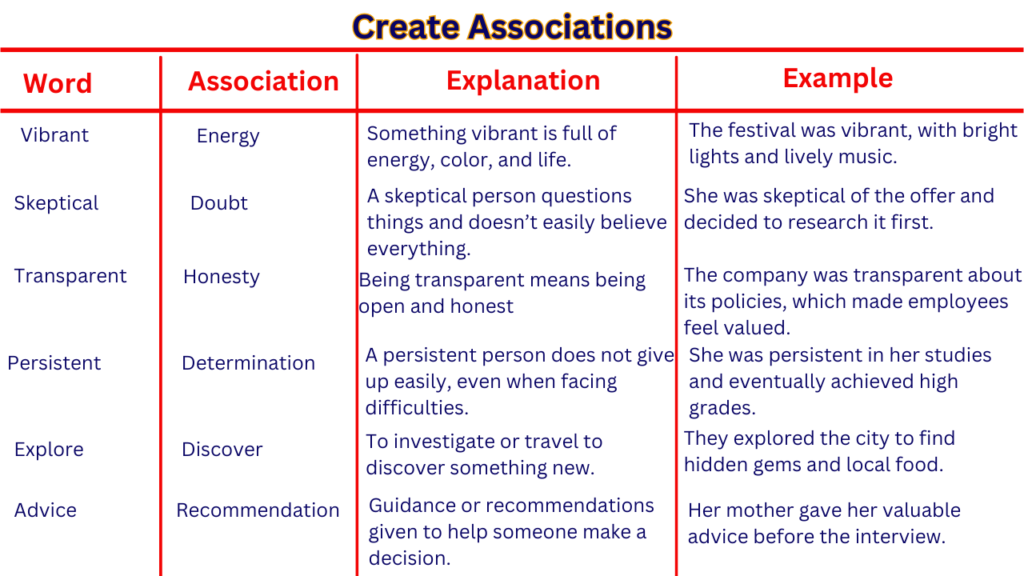Speak Smarter: How to Add New English Words to Your Daily Conversations

Have you ever struggled to find the right English vocabulary in the middle of a conversation or felt that your language could be a bit more sophisticated? You’re not the only one! Enhancing your English vocabulary is a journey that can take your everyday conversations to a whole new level. In today’s blog post, we’ll explore techniques for growing your English vocabulary and effortlessly incorporating new words into your daily interactions through English vocabulary exercises.
Why Expanding Your English Vocabulary Matters:
Let’s first discuss having a wide English vocabulary is crucial for effective communication:
Facilitate Communication: Express yourself with greater clarity and precision.
Boost Confidence: Speak with pride and impress everyone around.
Improve Understanding: Better grasp what you listen and read.
Become More Persuasive: Use the apt words to effectively influence others.
Strategies for Expanding Your Vocabulary:
1. Read Widely and Regularly:
Reading is a treasure trove for discovering new words. Be it fiction, non-fiction, newspapers, or blogs like this one, exposure to various writing styles makes you familiar with the kind of English vocabulary you might not come across in everyday life.
Example: Imagine you’re reading a mystery novel and encounter the word “elusive.” The context might be, “The detective found the suspect’s behavior elusive.” This helps you understand that elusive means difficult to find or catch, and you can start picturing how to use it in your conversations when talking about something hard to grasp.
2. Keep a Vocabulary Journal:
Whenever you come across a new word, note it down in a notebook dedicated for writing new English vocabulary. Write down its definition, part of speech (which can be many, in some cases), and an example sentence. Regularly review this journal and exercise English vocabulary.
Example: Suppose you come across the word “serendipity” (meaning a fortunate happening). Your entry might look like:
Word: Serendipity
Definition: An occurrence of events by chance in a happy or beneficial way.
Sentence: “Finding my old friend at the café was serendipity.”
3. Use Technology to Your Advantage:
Use different apps for building English vocabulary. They often use repetition, aiding in better word retention by testing them at increasing intervals. Attempting several English vocabulary exercises can also help you.
Example: Set a daily reminder to learn new words using these apps. Keep your daily target small enough not to let procrastination seep in. Imagine yourself learning words like “gregarious” or “ameliorate” and smoothly incorporating them into your conversations.
4. Engage in Conversations:
The most effective way to strengthen new English vocabulary is by using it as much as possible. Don’t hesitate to use new words in your conversations. Friends and colleagues can be wonderful partners in this learning journey.
Tip: If you learned the word “taciturn” to describe someone who’s usually quiet, you might say, “Ravi is often taciturn at the workplace,” and then explain its meaning if necessary. This not only reinforces your understanding but also helps others learn new words.
5. Play Word Games:

Scrabble, crossword puzzles, and some apps like Wordle are not only entertaining but also excellent for learning new words. They prompt you to think about words in creative and unique ways.
Example: Playing Scrabble might introduce you to “quixotic,” which means exceedingly idealistic. You could use it in a sentence like, “Your plan to save the world overnight is quixotic but admirable,” which can lead to engaging discussions.
6. Learn a Word a Day:
Set a goal to learn one new word every day. Numerous websites and apps offer a “word of the day” feature to help with this. You can subscribe to some of these resources to keep adding to yourEnglish vocabulary.
Example: If today’s word is “pedantic,” meaning overly concerned with minute details or formalisms, think about how you could use it in real life: “The book club discussions can get pedantic when we spend too much time on minor plot details.”
Incorporating New Words into Daily Conversations:
Incorporating new words into daily conversations can be a fun-filled and rewarding process that significantly improves your communication skills. Here are some practical tips to help you effortlessly add new English vocabulary into your everyday interactions:
1. Start Small and Natural
Start by introducing one or two new words at a time. The aim is to use these words in a natural way. Make sure to use the word enough times to have better retention. Try learning a variety of words to be able to express ideas well.
Example: Instead of saying “very excited,” you might say, “I’m ecstatic about our upcoming trip.”
2. Use Words in Context
Make sure to use new words in the right contexts. This approach is crucial to make grammatically correct sentences and to remember the words, for a long time.
Example: If you’ve learned the word “facetious” (treating serious issues with deliberately inappropriate humor), you might use it when someone makes a joke in a serious meeting: “I think your facetious comment lightened the mood during that intense discussion.”
3. Practice with Writing
Try using new words in your emails, text messages, or social media posts. This practice provides an opportunity to meticulously include new English vocabulary.
Example: When describing a busy day, you might say, “It was a very hectic day,” or enhance it to, “Today was frenetic with all the meetings and deadlines.”
4. Engage in Conversations
Use new words in your emails, text messages, or social media posts. Writing provides an opportunity to thoughtfully include new English vocabulary.
Example: When describing a busy day, you might say, “It was a very hectic day,” or enhance it to, “Today was frenetic with all the meetings and deadlines.”
5. Tell Stories

Sharing personal stories is an excellent way to introduce new words. Narratives provide proper context for the vocabulary, making it easier for both you and your listeners to recall. Do this exercise often to use the newly leant vocabulary effectively.
Example: Describe an experience: “During our hike, we came across an ephemeral waterfall that was stunning but only lasted a few minutes.”
6. Create Associations
Try creating associations with new words by connecting them to experiences, people, or events in your life. This is an effective way to have better retention. Over time, you’ll be able to remember the words without recalling their associations.
Example: If you learn the word “gregarious” (sociable and outgoing), consider a friend who behaves similar to this trait and mention it when you talk about them: “Neha is so gregarious; she makes friends wherever she goes.”

7. Ask Questions
Use new words into your questions to keep the conversation lively and engaging. This way, you can use the word many times. Also, you’ll be able to understand the possible usage of the word.
Example: If you’re discussing different cultures, you might ask, “Are there any cultural idiosyncrasies in your country that you find intriguing?”
8. Join Discussions and Groups
Join book clubs, discussion groups, or language exchange meetups. These opportunities often provide a platform for the use of a richer English vocabulary and conducive environment for practice. Try using the new vocabulary, in the relevant context, through various activities.
Example: In a book club, you might say, “The protagonist’s resilience was laudable, don’t you agree?”
9. Teach and Explain
When you use a new word, briefly clarify its meaning if your conversation partner is not familiar with the word. Explaining words to others is an effective way to reinforce your own understanding of the English vocabulary.
Example: “She was taciturn, which means she didn’t speak much during the meeting.”
10. Practice Public Speaking

Grab opportunities for public speaking. Public speaking compels you to be more selective with your English vocabulary choices.
Example: In a speech about personal growth, you might say: “The journey was arduous, but the results were rewarding.”
11. Incorporate into Daily Routines
Incorporate new words into your daily routines, such as summarizing your day or planning your tasks aloud using the new English vocabulary.
Example: At the end of the day, you might say to yourself, “Today I had a very productive but hectic schedule.”
12. Stay Consistent
Repetition is crucial. Use the new English vocabulary frequently in different contexts until it comes naturally to you. There is no fixed number as to how many times you need to use a word, for better retention. Try using it as many times as possible, so that, the word stays in your mind and can be used when you need it.
Frequently Asked Questions (FAQs)
1. Why is building English vocabulary important for daily conversations?
A strong English vocabulary helps you express ideas clearly and confidently. When you know the right English vocabulary words, conversations feel easier and more natural, whether in casual chats, classrooms, or workplaces.
2. What are some effective English vocabulary strategies?
Good English vocabulary learning strategies include reading regularly, keeping a word journal, using flashcards, and practicing new words in sentences. For English language learner vocabulary strategies, repetition and active usage are key to long-term memory.
3. How can I remember new English vocabulary words with meaning?
Link each word to a personal example or situation. For instance, if you learn the word ‘generous’, you might think: “My friend is generous because she always shares food.” This way, you connect English vocabulary words with meaning and context.
4. Should I use an English vocabulary book or an English vocabulary app?
Both can help. An English vocabulary book gives structured lists and explanations, while an English vocabulary app provides interactive quizzes, audio pronunciation, and practice exercises. Using both together makes your learning stronger.
5. How do I practice English vocabulary with examples?
Create short dialogues, sentences, or mini-stories using new words. For example, if the word is ambitious, you can say: “She is ambitious because she studies late at night.” Practicing English vocabulary with examples ensures the words stays in your memory.
6. Are English high vocabulary words necessary for daily life?
Not always. English high vocabulary words (like serendipity or meticulous) are useful for advanced learners, academic writing, or exams. However, for daily conversations, focus first on practical and commonly used words.
7. How can I check my progress in vocabulary learning?
Take an English vocabulary test regularly—many are available online or in apps. These tests show which words you remember well and which ones you need to revise.
8. What is a simple English vocab strategy for beginners?
A simple English vocab strategy is the “3-2-1 rule”: learn 3 new words daily, make 2 example sentences with each, and use at least 1 in conversation. This habit builds vocabulary step by step without pressure.
9. How can students apply English language learner vocabulary strategies in class?
Students can highlight new English vocabulary words in textbooks, use sticky notes, and practice with peers. Teachers often recommend group activities, role-plays, and short presentations to apply vocabulary naturally.
10. How do I incorporate new words into real conversations?
Don’t just memorize—use! When you learn a new word, try to use it the same day in a text, chat, or spoken conversation. Daily usage is the most practical of all English vocabulary strategies, because it makes words active instead of passive.
Conclusion:
By consistently applying these strategies, integrating new English vocabulary into your daily conversations will gradually become easier and more natural. Enjoy the process of learning and making use of new words, and soon you’ll be able to impress others with your enhanced English vocabulary!
Eager to enhance your English vocabulary and use it confidently in daily conversations? Start implementing our strategies today! Follow our blog for more tips and resources to expand your vocabulary. Share your favorite new words and how you’re using them in the comments section below—we’d love to hear your success stories!
Want to learn new English words faster?
I create content to make English learning simple and practical. If you find it helpful, consider supporting me Your contribution helps me improve my skills and bring better content for you.




I’m really impressed along with your writing talents as smartly as with the layout in your blog. Is that this a paid subject matter or did you modify it your self? Anyway keep up the excellent high quality writing, it is uncommon to look a nice blog like this one nowadays.
Thanks for your positive feedback!
Terrific work! That is the type of information that are supposed to be shared across the internet. Shame on Google for no longer positioning this put up upper! Come on over and talk over with my web site . Thank you =)
Thank you for appreciating my content in such an emotional way! I promised to bring even better content in the future. Keep posting your feedback for guiding me.:)
Real good visual appeal on this web site, I’d rate it 10 10.
Thank you so much! Will try my best to live up to your expectation.
Keep functioning ,great job!
Thank you for your feedback!
I’m curious to find out what blog system you have been using? I’m experiencing some minor security issues with my latest site and I’d like to find something more secure. Do you have any solutions?
I have built my website by myself, piece by piece, but I don’t know much about the technical aspects yet. Therefore, I may not be able to help regarding the matter you mentioned. Thank you!
Greetings! Very helpful advice on this article! It is the little changes that make the biggest changes. Thanks a lot for sharing!
You are absolutely right! Thanks for your comment.:)
so much fantastic information on here, : D.
Glad to know you found value in my content. 🙂
Hi, Neat post. There is an issue along with your web site in internet explorer, may test this… IE nonetheless is the marketplace leader and a good element of folks will pass over your fantastic writing due to this problem.
Thank you for your honest feedback!
I think this is one of the most vital information for me. And i’m glad reading your article. But want to remark on few general things, The website style is great, the articles is really excellent : D. Good job, cheers
Thank you! Keep exploring the site for useful stuff.
Thanx for the effort, keep up the good work Great work, I am going to start a small Blog Engine course work using your site I hope you enjoy blogging with the popular BlogEngine.net.Thethoughts you express are really awesome. Hope you will right some more posts.
All the best! thank you for your feedback.
When I initially commented I clicked the -Notify me when new feedback are added- checkbox and now every time a comment is added I get 4 emails with the identical comment. Is there any means you may remove me from that service? Thanks!
Thanks for letting me know! It looks like the comment-notification system subscribed you multiple times or sent duplicate alerts. I’ll remove your email from the notification list so you won’t receive further duplicate messages.
Real fantastic information can be found on web site.
Thank you for your feedback! keep coming back for more.
I am no longer sure the place you are getting your info, however great topic. I must spend a while finding out much more or working out more. Thank you for magnificent information I was looking for this information for my mission.
Happy to help! Subscribe for more.
I have been exploring for a little bit for any high quality articles or blog posts on this kind of area . Exploring in Yahoo I ultimately stumbled upon this website. Studying this info So i am glad to express that I’ve an incredibly excellent uncanny feeling I found out exactly what I needed. I so much certainly will make certain to do not overlook this site and provides it a look regularly.
Glad that you found the post helpful!
Hiya, I am really glad I’ve found this info. Today bloggers publish only about gossips and internet and this is really irritating. A good site with interesting content, this is what I need. Thank you for keeping this website, I’ll be visiting it. Do you do newsletters? Cant find it.
Thank you for your lovely feedback! Yes, I send newsletters every month. You just need to subscribe using the option on the home page.
I do agree with all the ideas you have introduced to your post. They’re really convincing and will definitely work. Nonetheless, the posts are very brief for beginners. May you please prolong them a bit from next time? Thank you for the post.
Sure! I’ll write longer posts. Thanks for your feedback.
Hello my friend! I want to say that this article is awesome, nice written and include approximately all important infos. I would like to look extra posts like this .
Thanks!